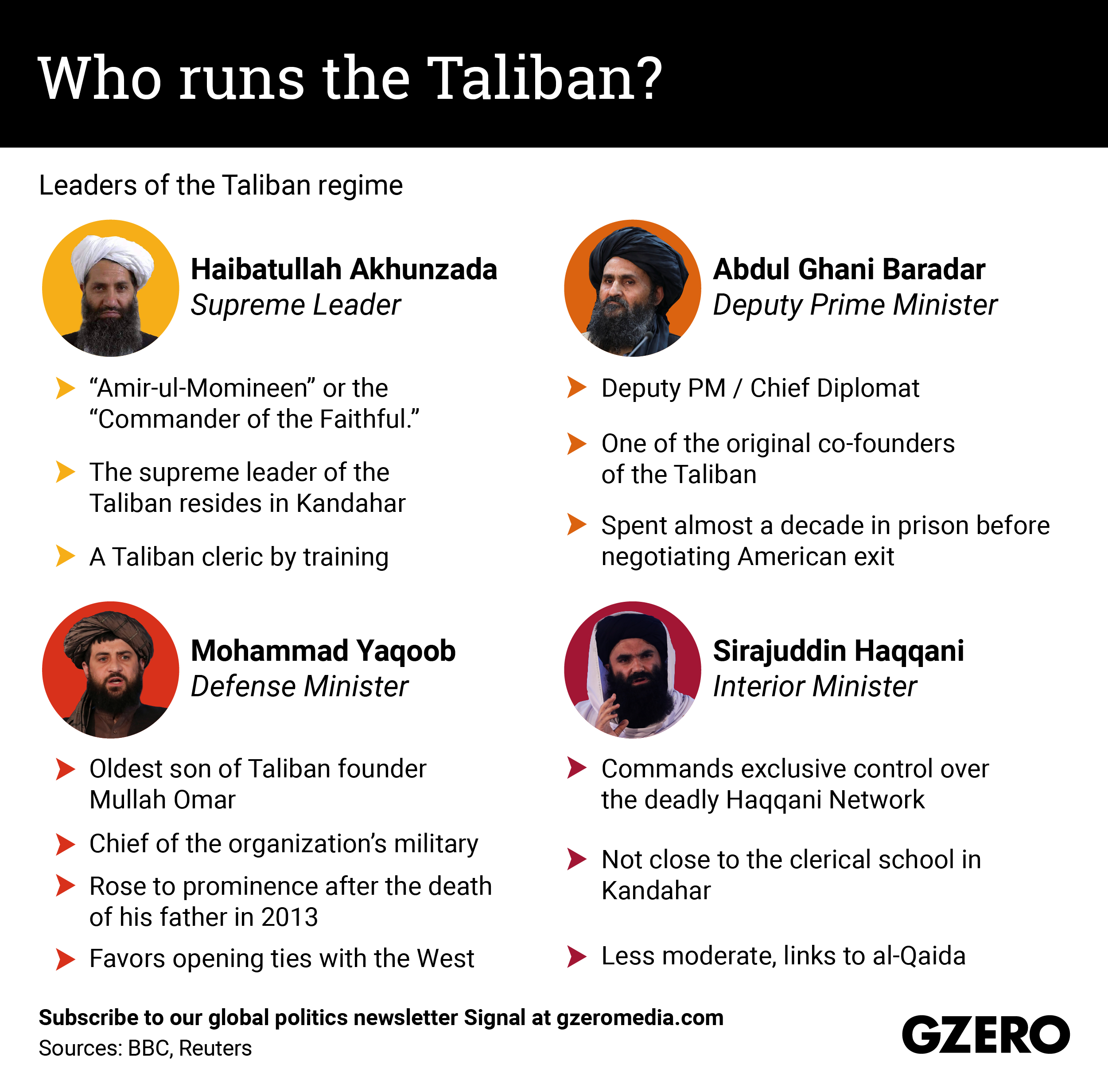The Taliban have been in control of Afghanistan for a full year. But before they took over, they had a shadow government operating across vast swaths of the country, complete with a justice, policing, and tax system. After the US left, and the democratic Afghan government fled, the Taliban didn’t take long to form an “interim” government not just in Kabul but also their own “spiritual” capital of Kandahar. Today, the regime is split, with the all-important religious leadership residing in Kandahar, and the more bureaucratic, hands-on cadres in Kabul. And this comes with its political divides as well: recently the Kandahar-based supreme leader vetoed Kabul’s decision to let girls return to schools. We list the leading who’s who of the Taliban regime.
More from GZERO Media
- A general view outside Exchange Square in Hong Kong's financial district. Asian stock markets have plummeted amid growing fears of a global trade war, as Donald Trump described his tariffs as ''medicine'' and showed no indication of backing down.
In the latest twist of the United States’ trade war with China and the world, US President Donald Trump declared Monday that he would impose an additional 50% levy on Chinese imports on April 9 if Beijing refuses to drop its retaliatory tariff.
Civil wars from around the world (feat. 2000s pop bangers).
In response to warnings from US officials of looming air attacks by US forces, the leaders of four of the largest Iran-backed militia groups operating in Iraq told Reuters on Monday that they were prepared to surrender their weapons to Iraqi government authorities.
Rising geopolitical risks and global trade conflicts demand proactive strategies, not reactive responses. RBC’s experts break down the implications of tariffs on the economy, markets, and industries to help you navigate uncertainty, build resilience, and unlock investment opportunities – turning risk into competitive advantage.
The markets are tanking as the US attacks globalization through Trump's tariff wall. In this Quick Take, Ian Bremmer examines who bears the cost of this anti-globalist push.
US President Donald Trump’s “Liberation Day” tariffs have been met with anger, outrage, and disbelief in every corner of the world – including islands inhabited solely by penguins. At last count, over 50 countries want to talk trade with Washington, while in the US, opposition to Trump’s presidency is getting organized. Here’s a look at this weekend’s reactions.
Netanyahu and Trump to talk tariffs, terror, Turkey, and more at White House on Monday
Israeli Prime Minister Benjamin Netanyahu will meet with US President Donald Trump at the White House on Monday. It will be his second such visit since Trump’s inauguration in January, and it comes after the president’s impromptu invitation last Thursday, when the two men spoke by phone about new US tariffs. They are expected to discuss those – and a whole lot more.
Thousands of supporters of France’s far right gathered at Place Vauban in Paris on Sunday to support Marine Le Pen, leader of the National Rally party. The three-time presidential candidate was recently convicted of embezzling European Union funds to pay staff, resulting in a five-year ban on holding public office, effectively barring her from France’s 2027 presidential election.
Members of the M23 rebel group stand guard as people attend a rally addressed by Corneille Nangaa, Congolese rebel leader and coordinator of the AFC-M23 movement, in Bukavu, eastern Democratic Republic of Congo, on Feb. 27, 2025.
Representatives of the Democratic Republic of Congo and the M23 rebel group held peace talks in Doha, Qatar, last week to resolve the armed conflict engulfing eastern DRC since January. Qatari mediators began facilitating private discussions ahead of the first formal meeting between the two groups, planned for April 9.
